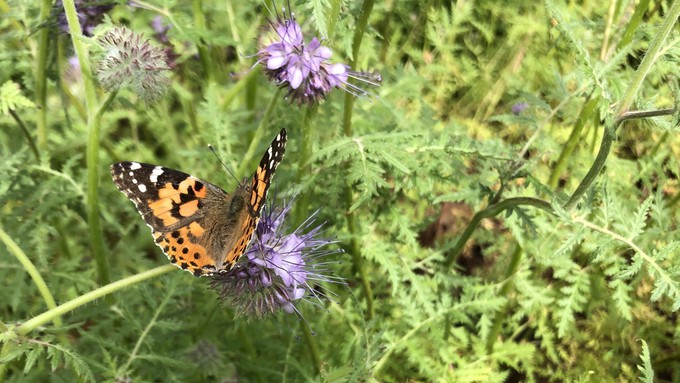
Placer County master gardeners offer free pollinator workshop

A painted lady butterfly revels in the nectar from a lacy phacelia plant, which is a California native. Kathy Morrison
How do you get more fruit and vegetables from your garden? Start by inviting more pollinators into your landscape.
Get ready for a spring full of bees and butterflies with the help of this free workshop, “Attracting Pollinators to Your Garden.”
Set for 10:30 a.m. Saturday, March 11, this one-hour workshop will be offered live in person as well as via Zoom. Presented by the master gardeners of Placer County, the class will not only share how to attract bees, butterflies and birds, but how to keep them around.
“(The class is about) attracting and protecting our winged visitors,” say the master gardeners. “Come and learn what hummingbirds, butterflies, native bees and other garden visitors need in our gardens. See the plants!”
The in-person session will be held at Loomis Library, 6050 Library Drive, Loomis. To see it on Zoom, register in advance with this link:
https://us02web.zoom.us/meeting/register/tZwvduCqrTIoEtf1gBFONrxiLZacECgfLQUK
Upcoming workshops presented by Placer County master gardeners include straw bale gardening (March 18) and “Firescaping” (April 8). Learn more at: https://pcmg.ucanr.org/.
Comments
0 comments have been posted.Sacramento Digs Gardening to your inbox.
Food in My Back Yard Series
April 1: Don't be fooled by these garden myths
March 25: Fertilizer tips: How to 'feed' your vegetables for healthy growth
March 18: Time to give vegetable seedlings some more space
March 11: Ways to win the fight against weeds
March 4: Potatoes from the garden
Feb. 25: Plant a fruit tree now -- for later
Feb. 18: How to squeeze more food into less space
Feb. 11: When to plant? Consider staggering your transplants
Feb. 4: Starting in seed starting
Sites We Like
Garden Checklist for week of March 30
Your garden doesn’t mind April showers. Get busy now to enjoy those future flowers.
* Get ready to swing into action in the vegetable garden. As nights warm up over 50 degrees, start setting out tomato, pepper and eggplant transplants.
* From seed, plant beans, beets, cantaloupes, carrots, corn, cucumbers, melons, pumpkins, radishes and squash. (Soak beet seeds overnight in water for better germination,)
* Plant onion sets.
* In the flower garden, plant seeds for asters, cosmos, celosia, marigolds, salvia, sunflowers and zinnias.
* Transplant petunias, zinnias, geraniums and other summer bloomers.
* Plant perennials and dahlia tubers for summer bloom.
* Transplant lettuce and cabbage seedlings.
* April is the last chance to plant citrus trees such as dwarf orange, lemon and kumquat. These trees also look good in landscaping and provide fresh fruit in winter.
* Smell orange blossoms? Feed citrus trees with a low dose of balanced fertilizer (such as 10-10-10) during bloom to help set fruit. Keep an eye out for ants.
* Apply slow-release fertilizer to the lawn.